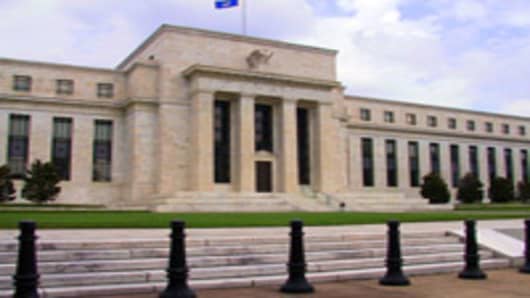After better economic data and increasingly hawkish comments from some US central bankers, Wall Street is beginning to price in a more aggressive Federal Reserve, according to the latest CNBC Fed Survey.
The survey found that about a third of the economists, fund managers and strategists who responded to the survey see the Fed hiking interest rates this year, double the percentage from the March survey.
About 27 percent believe the Fed will begin selling assets in the second half of 2011, to reduce the size of its portfolio, up from around 16 percent in the prior survey.
"The Fed shows more restive Hawks. Inflation expectationsshow sign of moving up," wrote economist Robert Brusca in response to the survey. "Job growth is now looking pretty self sustaining above 200K. All the ingredients are there. What is the Fed waiting for?"
Slightly more than half of the 69 respondents believe Fed policyis now "too accomodative," up from 44 percent in March.
The percentage who believe the Fed has policy "just right" declined to 42 percent from 50 percent.
"Given the lags in monetary policy, there is a significant risk that the Fed will move too late in its tightening process," wrote Lynn Reaser, economics professor at Point Loma Nazarene University. "A 'catch-up' in terms of more rapid rate hikes is likely to be necessary."
While many believed the Fed will get it wrong, a substantial minority are putting thier money on the Fed getting it right.
Hank Smith of Haverford Investments said: "The most contrarian view point today is the Fed will get it mostly right in withdrawing the excess liquidity and moving towards a more neutral stance that does not spark too much inflationary expectations and at the same time does not choke off the economic expasion. I am taking the contrary position."
Survey respondents gave a mixed message on the impact of the press conferences that the Fed recently announced would be held by Fed Chairman Ben Bernanke.
A robust 68 percent said they believed that the press conferences, to be held four times a year, would make Fed policy more clear. Just seven percent thought it would lead to greater policy confusion.
But 47 percent said the press conference would create greater volatility in the stock and bond markets with 41 percent believing there would be no market impact.
Lou Crandall of Wrighton Associations responded: "The press conferences are likely to make markets more volatile on the days of FOMC meetings, but should reduce the volatility in subsequent weeks, as they will provide more context for the comments made by individual FOMC members."
But Diane Swonk of Mesirow Financial wrote, "Even the announcing of the conferences seems to have pushed naysayers to be more rather than less vocal."
The outlook for a third round of quantitative easing remains muted.
Only about a quarter of respondents believe the Fed will continue to buy assets after the expiration in June of the Fed's current quantitative easing program to purchase $600 billion of treasuries. On average they expect around $50 billion of additional purchases.



